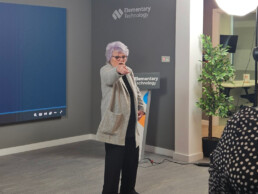What are the Codes of Restricted and Elaborated Speech?
Codes of speech are the many different styles and forms of speech that people from around the English-speaking world use naturally and intuitively – or may be taught. They are often associated with specific locations across a country or different parts of the world, although some are generic and may be used alongside other codes. I quote:
Speech codes refer to the patterns of speech used by different social groups. These codes encompass vocabulary, syntax, and the underlying rules governing language use within a social context. (Easy Sociology, May 30th 2024)
The most commonly modelled and taught code of speech across England and the planet must be the agreed code of Standard English due to its priority in English education – and in reality this is a feature of speech that may be spoken in any accent as long as the speaker conforms to the rules of grammar, pronunciation and spelling in writing as agreed in the standardised form. This agreement was achieved over a period of almost 100 years in the second half of the fourteenth century and the early fifteenth century and became crucial in order to improve mutual understanding – which was growing increasingly difficult due to the many diverse dialects, patois and accents. It is essential for schools to teach Standard English – not to change the way children speak in their daily lives but so that they are able to write in Standard English and to read and understand it for wider communication purposes.
There are some who assume that Standard English also means elaborated speech or even Received Pronunciation – but whilst both of these codes are almost always in Standard English, the reverse is not applicable. Standard English may be simple in structure and vocabulary, and spoken within a local accent. I talk in my local Yorkshire accent (by choice as I commonly switch between four different codes) but I also follow the rules of Standard English except when I wish to exemplify dialect or a stronger accent.
Received Pronunciation (RP) is the correct name for what many of us – especially a Tyke like me – would call ‘posh’ talk. It’s the code of the aristocracy, royalty and many of the historically wealthy families – and is also commonly used by many in the world of academia. It involves the more affected pronunciation of crisp and elaborate English. You may hear that the speaker’s consonants throughout words are more clearly enunciated, and that inflexion and expression enrich the elaboration and conform with the expected norms of the more privileged in society.
However, elaborated speech may be used in other codes besides RP, including in all mild local accents, neutral accent and even sometimes within strong local accents in England. Our colleagues and friends in Scotland, Northern Ireland, the Republic, and Wales, as well as those in the USA, Canada, South Africa, Australia, New Zealand and others all speak English as their first language, each with their own unique accents, often with the elaborated code and in a mix of Standard and non-Standard English. Thus, the codes of English combine and blend to produce unique and colourful local speech.
Dialects are – for me – the most fascinating forms of speech in our country. They originated when communities grew and developed in isolation. Dialects are often unique to a locality. They have their own grammatical forms and some of the vocabulary is totally unique to that specific area. I will exemplify a Yorkshire dialect now:
Ayeup sithee, is’t thar ganging dahn’t ginnel Lass, ‘r is’t thar jus’ callin’ ower’t’wall awl’t deay?
Dialects do not conform to the rules of Standard English, so that many of the rules of grammar and of sentence structure may seem to be broken. Some vocabulary does not exist in Standard English and there is an increased use of contraction – often in ways that also do not conform. It is for these reasons – particularly the ‘short cuts’ of incomplete sentences and limited enrichment – that dialects are considered to represent the restricted code. Dialects do not use the elaborated code of enriched language, yet they are also unique and powerful, and of equal importance and significance as all other codes – they are just different.
Local accents are possibly the most frequently heard forms of speech for most of us as they are derived from former dialects that are softened, modified and conform to most or all of the rules of Standard English. I talk mainly in a Yorkshire local accent, not because it’s the only way I can talk but because I’m proud of my culture and my heritage. When us is using a broader local accent, yer’ll ‘ear some dropping uv letters like ‘t’s an’ ‘h’s an’ d’s, an’ some grammatical forms of verbs is not quite right. You might hear us say things like ‘he were’ or ‘they is’ or ‘we’s gone’. In the main, however, the language is in Standard English and children learn how to correct their spoken deviations in school as their writing prowess develops.
Two codes of speech that have historically remained the province of particular strata of the English-speaking population are the elaborated code and the restricted code. As the world of education turns its attention to Sir Keir Starmer’s cry for a focus on oracy, understanding of these two codes becomes increasingly important.
The elaborated code of speech has been in existence since civilisation developed – the Greeks were particularly known for their passion for rhetoric. Collins Dictionary defines rhetoric as:
- the study of the technique of using language effectively ·
- the art of using speech to persuade, influence, or please; …
This is a reasonable definition of oracy, at a time when we search to define this ‘new’ code of speech. For the Greeks, rhetoric, or the art of public speaking, initially developed to persuade. Greek society relied on oral expression, which also included the ability to inform and give speeches of praise, known then as epideictic (to praise or blame someone) speeches. (Lumen: Principles of Public Speaking)
The following words of Aristotle are extremely appropriate as a structure for working with children on developing the skills of oratory, and for best impact the language must be elaborated:
In making a speech one must study three points: first, the means of producing persuasion; second, the language; third, the proper arrangement of the various parts of the speech. – Aristotle
Lumen lists the Key Features of elaborated speech as:
- Explicitness: Speakers using elaborated codes articulate their meanings clearly, providing detailed explanations and justifications for their statements.
- Flexibility: This code allows for flexibility in language use, enabling speakers to adapt their speech to various contexts and audiences.
- Abstract Concepts: Elaborated codes often involve abstract concepts and hypothetical reasoning, which are essential for academic and professional discourse.
I feel that these features should explicitly include the features of language found, such as sophisticated sentence structures, suave vocabulary and rhetorical language, that are so much a part of it. The internet defines elaborated code in the following way:
Elaborated code refers to the language used in formal situations. Teachers, textbooks, and exam papers use this kind of language. It is characterised by its use of a wide range of vocabulary, complex sentence structures, and precise grammatical conventions.
From a teaching perspective, I feel that this description is extremely useful. Basil Bernstein (1924 to 2000) was a linguist and researcher in The Institute for Education at The University of London and he led important research that showed that having the ability to talk fluently in the elaborated code led to children learning to read and write earlier and to achieve more highly in examinations. This may have been the first use of the term ‘elaborated’.
Bernstein’s findings also showed that children only able to speak in the restricted code were severely disadvantaged in terms of academic progress and achievement, and he recommended that all children should be taught this code in school.
At the time of Bernstein’s research, the majority of children who were able to speak fluently and confidently in the elaborated code were those who had learnt it from their parents and family whilst growing up in the home, and these were children with an articulate parent or parents who already spoke in elaborated code. Public schools and some private schools also taught the elaborated code pro-actively to enhance performance and to enable rhetoric for debate. Children from homes where they only heard the restricted code most of the time, were usually only able to speak in that code.
The restricted speech code is characterised by its reliance on context-bound language. It uses a limited vocabulary and simpler sentence structures, with meanings often inferred from the immediate social context. Patois, dialects and strong local accents are all often confined entirely to a restricted code.
Sentences are mainly incomplete and abbreviated. Speech does not conform to the rules of Standard English and some vocabulary is unique to the dialect. Few state schools have ever taught the elaborated code and thus children who only speak in it remained severely disadvantaged.
Andrew Wilkinson started his career as a teacher and thus he identified fully with the findings of Bernstein. In the early 1960s he became a lecturer, linguist and researcher at the University of Birmingham. He took up the cause of teaching the elaborated code, which he named ‘oracy’, in 1965. Wilkinson created this name to raise the profile of the code and to give it equal status with literacy and numeracy in the curriculum. He strongly advocated that oracy was not to be taught to make all children change their daily speech, but was to be a code they had at their fingertips should they choose to use it.
Thus it is that the world of education is now listening to the plea from the Prime Minister – despite the fact that he, himself, is a somewhat lack-lustre speaker. At his behest, the Oracy Commission is working hard – under the leadership of the esteemed Geoff Barton – to provide a clear definition and guidelines to empower all schools to teach this vital additional code, not in order to change the way our pupils speak but in order to empower them to code switch into elaborated code if and when the time is appropriate and if they choose to.
May I close by reminding us all that all codes of speech are of equal importance and value, and the speaker must retain the right to use their natural code or a code of their choice in their daily life without fear of ridicule or judgement. No one code is better than the others – they are all different and are useful for different reasons. I choose to continue to speak in my Yorkshire accent, despite the fact that I was raised in a neutral code with elaborated speech and with the ability to switch naturally into RP when I desire to.
Ah’m Yorkshire an’ ah’m proud o’t!
Talk:Write
A fun and flexible approach to improving children’s vocabulary, speech, and writing.


